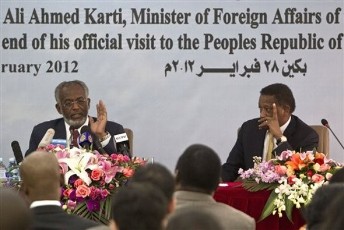Sudan asks China for help in resolving oil dispute with S. Sudan
February 28, 2012 (KHARTOUM) – The Sudanese government asked China to intervene and attempt to break the deadlock with South Sudan over the issue of oil.

Khartoum’s top diplomat said the letter was to reaffirm his country’s support for China’s investments in Sudan.
During his visit, Karti met with Vice President Xi Jinping and foreign minister Yang Jiechi as well as executives from state run Chinese National Petroleum Corporation (CNPC).
South Sudan decided to halt its oil production completely in retaliation to Khartoum’s confiscation of the crude pumped into pipelines that run through the north’s territory to Port Sudan.
Sudan said it did this because Juba did not pay month’s worth of oil transit fees.
The newborn state which became independent last July also accused some oil companies including Chinese ones of collaborating with the Sudanese government to “steal” its oil.
This month, South Sudan expelled the Chinese head of the largest foreign oil company, Petrodar Operating Company, which is part owned by China National Petroleum, accusing him of abetting Sudan’s diversion of oil and breaching terms of Memorandum of Understanding signed with Juba.
China sought to downplay the incident and called for “communication and consultations and put an end to misunderstandings to benefit long-term cooperation”.
Upon gaining independence from the north, South Sudan took with it 75% of the oil reserves that existed under the united country. China depends on South Sudan for nearly five percent of its oil imports. The split also divided their China invested oil industry, leaving the fields mostly in South Sudan but the two pipelines out of them running through Sudan.
At the centre of the Khartoum – Juba dispute is the issue of oil transit fees. All fees suggested by Sudan which fell between the ranges of $32-$36 per barrel were swiftly rejected by South Sudan. The latter says the fair charge is around $1 per barrel.
Sudan’s foreign minister accused unspecified foreign powers of inciting South Sudan to cut oil supplies to Sudan.
“Some people ask, what does it benefit South Sudan to stop oil production to Sudan? In our judgement, we believe that they’re doing this not in the interests of South Sudan but in the interests of foreign political powers,” Karti told a news conference at the Sudanese embassy, speaking through a Chinese interpreter.
“Many foreign powers do not want Sudan and China to profit from Sudan’s resources” he added.
“We are inviting also the companies, CNPBC and Petronas to give ideas also to help the mediation,” explained Karti, “and we are also inviting China and Malaysia and for sure, the Indians will be accepted also to give any ideas that will help the mediation to get a solution”.
Chinese officials who met with Karti avoided any appearance of siding with one side over the other.
Vice President Jinping said that China is concerned and hopes that north and South Sudan will resolve their dispute peacefully.
(ST)
